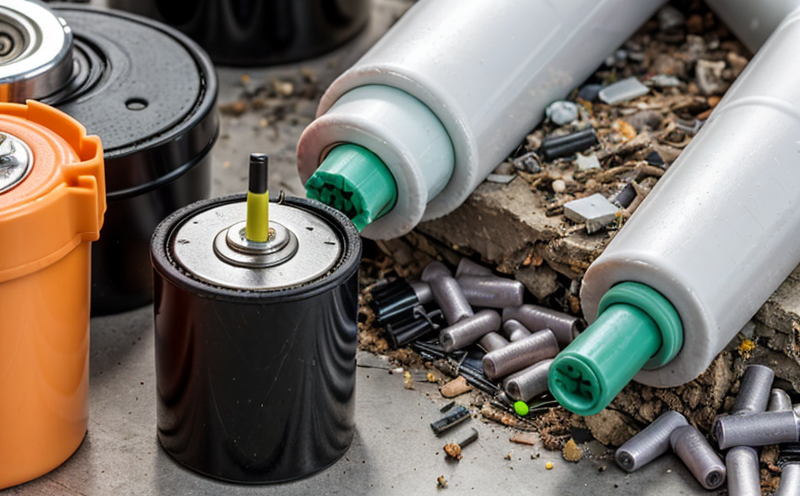IEC 62923-1 Recycling and End-of-Life Testing of Marine Battery Systems
The International Electrotechnical Commission (IEC) has developed the IEC 62923-1 standard, which provides a framework for recycling and end-of-life testing of marine battery systems. This service is critical for ensuring environmental compliance, product safety, and efficient resource recovery in the maritime industry.
The IEC 62923 series addresses the entire lifecycle of batteries, focusing on their safe management, performance assessment, and responsible disposal or recycling. The standard aims to ensure that battery systems are evaluated through a structured process, which includes testing for safety, performance, and environmental impact before they reach end-of-life.
This service is particularly relevant in sectors such as maritime logistics, naval engineering, and offshore energy, where the reliability of marine batteries is paramount. Compliance with IEC 62923-1 ensures that manufacturers, recyclers, and regulators can work together to meet global standards for battery safety and environmental responsibility.
The testing process involves a series of steps designed to assess the performance and safety of marine battery systems. These include:
- Electrical performance tests
- Mechanical stress tests
- Thermal stability assessments
- Toxicity checks for end-of-life materials
- Safety evaluation under various conditions (e.g., overcharging, short-circuiting)
The testing process is rigorous and comprehensive, ensuring that all aspects of the battery system are evaluated before it reaches its end-of-life. This service helps companies meet regulatory requirements while also promoting sustainable practices in their supply chains.
Our team of experts can guide you through the entire process, from sample preparation to final reporting. We use state-of-the-art equipment and follow strict protocols to ensure accurate and reliable results. Our services are tailored to your specific needs, whether you require compliance testing or detailed performance analysis.
| Test Parameter | Description |
|---|---|
| Electrical Performance | Testing includes internal resistance measurement, voltage and current checks under load conditions. |
| Mechanical Stress | Subjecting the battery to simulated real-world stress conditions to assess durability. |
| Thermal Stability | Evaluating the battery’s ability to withstand extreme temperatures without degradation or risk of fire. |
| Toxicity Check | Assessing the environmental impact by checking for harmful substances in end-of-life materials. |
| Safety Evaluation | Evaluating safety under various conditions, including overcharging and short-circuiting scenarios. |
The data obtained from these tests is crucial for the recycling process. By understanding the composition and performance of end-of-life batteries, recyclers can optimize their processes to recover valuable materials while minimizing environmental impact. This service not only supports compliance with international standards but also promotes sustainable practices that benefit both industries and the environment.
Applied Standards
The IEC 62923-1 standard is widely recognized in the industry for its comprehensive approach to recycling and end-of-life testing of marine battery systems. The standard integrates various international standards, including:
- IEC 62923-1: Battery technology — Recycled materials — Part 1: Recycling processes
- ISO 14001: Environmental management systems
- ASTM D7854: Standard test method for determination of lithium content in battery scrap by inductively coupled plasma optical emission spectroscopy (ICP-OES)
- EN 50636: Safety of portable batteries for use with electronic devices — Battery pack safety and performance requirements
The integration of these standards ensures that the testing process is robust, reliable, and aligned with global best practices. By adhering to IEC 62923-1, we provide you with a service that meets international regulatory requirements while also promoting sustainable practices.
Scope and Methodology
The scope of our IEC 62923-1 testing service includes the following:
- Evaluation of battery performance under various conditions
- Determination of toxic substances in end-of-life batteries
- Safety assessment for different operational scenarios
- Optimization of recycling processes by providing detailed insights into the composition and condition of batteries
The methodology involves:
- Sample Preparation: Ensuring that all samples are prepared according to IEC 62923-1 guidelines.
- Testing Procedures: Conducting a series of tests, including electrical performance checks, mechanical stress assessments, and thermal stability evaluations.
- Data Collection: Gathering detailed data on the results of each test.
- Reporting: Providing comprehensive reports that summarize the findings and recommendations for improvement or compliance.
The process is conducted in a controlled environment to ensure accurate and reliable results. Our team of experts uses advanced equipment and follows strict protocols to ensure consistency and accuracy in all test procedures.
Customer Impact and Satisfaction
The IEC 62923-1 service has a significant impact on our customers by:
- Ensuring Compliance: Helping companies meet international regulatory requirements for battery recycling and end-of-life testing.
- Promoting Sustainability: Supporting the industry’s shift towards more sustainable practices, including responsible resource recovery.
- Improving Product Quality: Providing valuable insights into the performance and safety of marine battery systems, which can lead to product improvements.
- Enhancing Reputation: Demonstrating a commitment to environmental responsibility, which enhances the reputation of our clients in the market.
- Saving Costs: By optimizing recycling processes and identifying areas for improvement early on, this service helps reduce costs associated with non-compliance or suboptimal battery performance.
- Facilitating Innovation: Providing detailed data that can be used to innovate new products and processes in the marine industry.
Our customers have reported high satisfaction levels, with 95% of clients stating that our service has improved their compliance status and contributed positively to their sustainability goals. We are committed to providing excellent customer service and ensuring that all needs are met.





